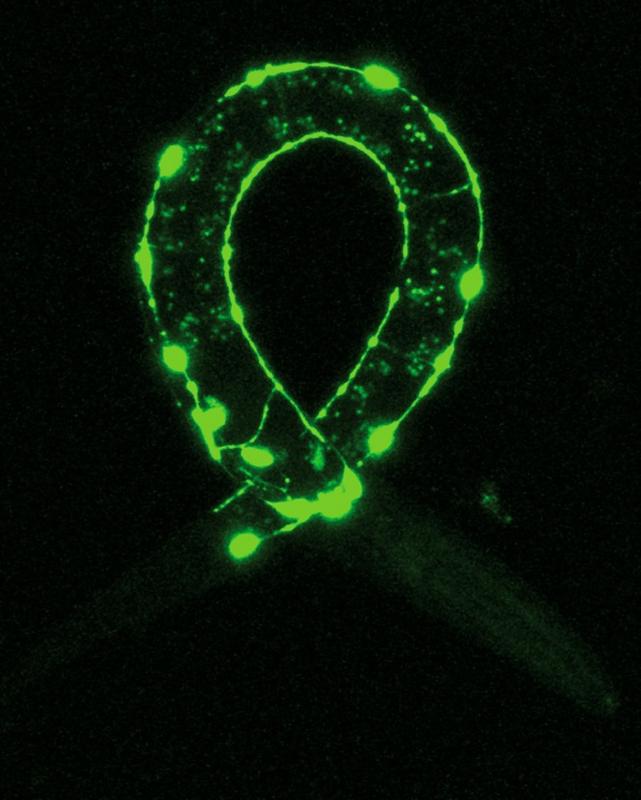Forgetting Is Actively Regulated

The nervous system of the ringworm C. elegans (Illustration: MCN)
The human brain is build in such a way, that only necessary information is stored permanently – the rest is forgotten over time. However, so far it was not clear if this process was active or passive. Scientists from the transfaculty research platform Molecular and Cognitive Neurosciences (MCN) at the University of Basel have now found a molecule that actively regulates memory loss.
The so-called musashi protein is responsible for the structure and function of the synaptic connections of the brain, the place where information is communicated from one neuron to the next.
Using olfactory conditioning, the researchers Attila Stetak and Nils Hadziselimovic first studied the learning abilities of genetically modified ringworms (C.elegans) that were lacking the musashi protein. The experiments showed that the worms exhibited the same learning skills as unmodified animals.
However, with extended duration of the experiment, the scientists discovered that the mutants were able to remember the new information much better. In other words: The genetically modified worms lacking the musashi protein were less forgetful.
Forgetting is no coincidence
Further experiments showed that the protein inhibits the synthesis of molecules responsible for the stabilization of synaptic connections. This stabilization seems to play an important role in the process of learning and forgetting.
The researchers identified two parallel mechanisms: One the one hand, the protein adducin stimulates the growth of synapses and therefore also helps to retain memory; on the other hand, the musashi protein actively inhibits the stabilization of these synapses and thus facilitates memory loss. Therefore, it is the balance between these two proteins that is crucial for the retention of memories.
Forgetting is thus not a passive but rather an active process and a disruption of this process may result in serious mental disorders. The musashi protein also has interesting implications for the development of drugs trying to prevent abnormal memory loss that occurs in diseases such as Alzheimer’s. Further studies on the therapeutic possibilities of this discovery will be done.
The Transfaculty Research Platform MCN
The Transfaculty Research Platform MCN is a joint endeavor of the Faculty of Psychology at the University of Basel and the Psychiatric University Clinics Basel. Its goal is to advance research on the neurobiological underpinnings of human emotional and cognitive processes and to contribute to the development of novel treatment options for neuropsychiatric disorders. The platform is jointly led by Prof. Dominique de Quervain and Prof. Andreas Papassotiropoulos.
Original source
Hadziselimovic, N., Vukojevic, V., Peter, F., Milnik, A., Fastenrath, M., Fenyves, B., Hieber, P., Demougin, P., Vogler, C., de Quervain, D.J.F., Papassotiropoulos, A. & Stetak, A.
Forgetting is regulated via Musashi-mediated translational control of the Arp2/3 complex.
Cell, online.
Further information
Prof. Dr. med. Andreas Papassotiropoulos, Transfaculty Research Platform «Molecular and Cognitive Neurosciences», Faculty of Psychology at the University of Basel and the Psychiatric University Clinics Basel, phone +41 (0)61 267 05 99, email: andreas.papas@unibas.ch
Media Contact
More Information:
http://www.unibas.chAll latest news from the category: Life Sciences and Chemistry
Articles and reports from the Life Sciences and chemistry area deal with applied and basic research into modern biology, chemistry and human medicine.
Valuable information can be found on a range of life sciences fields including bacteriology, biochemistry, bionics, bioinformatics, biophysics, biotechnology, genetics, geobotany, human biology, marine biology, microbiology, molecular biology, cellular biology, zoology, bioinorganic chemistry, microchemistry and environmental chemistry.
Newest articles

A universal framework for spatial biology
SpatialData is a freely accessible tool to unify and integrate data from different omics technologies accounting for spatial information, which can provide holistic insights into health and disease. Biological processes…

How complex biological processes arise
A $20 million grant from the U.S. National Science Foundation (NSF) will support the establishment and operation of the National Synthesis Center for Emergence in the Molecular and Cellular Sciences (NCEMS) at…

Airborne single-photon lidar system achieves high-resolution 3D imaging
Compact, low-power system opens doors for photon-efficient drone and satellite-based environmental monitoring and mapping. Researchers have developed a compact and lightweight single-photon airborne lidar system that can acquire high-resolution 3D…





















